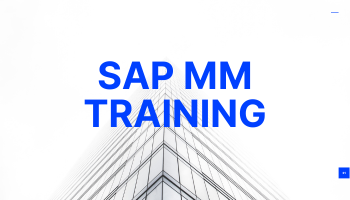Your cart is currently empty.
SAP MM Training in Bangalore, SAP Material Management (SAP MM) is a module of the SAP Enterprise Resource Planning (ERP) package that is used for Procurement Handling and Management. The module has two important master data – material and vendor. Broadly, the various levels that can be defined for a SAP MM implementation are: Client, Company Code, Plant, Storage Location and Purchase Organization. SAP MM offers a fantastic career option for individuals with experience in Supply Chain Management and Procurement, and can be tailored to particular company requirements as needed.

Online-Classroom
3 Months Duration
Live Class Facilities
Interviews Assured
Live Server
SAP MM Traning in Bangalore with Placements. SAP MM is nothing but Materials Management, is a module within the SAP ERP (Enterprise Resource Planning) system. It is designed to manage and optimize various aspects of materials and procurement processes within an organization. SAP MM plays a crucial role in integrating and streamlining the procurement process, from planning and requisitioning to receiving and payment. SAP MM is widely used across industries and is essential for organizations looking to optimize their material and procurement processes, enhance supply chain efficiency, and maintain accurate inventory records. It provides real-time visibility into material-related activities, contributing to better decision-making and overall business success.
SAP MM Training in Bangalore. A well-structured training program should cover the full spectrum of SAP MM functionalities, including procurement processes, master data management, inventory management, goods receipt, and invoice verification.
Practical exposure is crucial. Effective training programs often include hands-on exercises and real-world scenarios to ensure participants can apply theoretical knowledge to practical situations.
Trainers with practical experience and expertise in SAP MM can provide valuable insights and real-world examples, enhancing the overall learning experience.
Engaging with real-life projects and case studies allows participants to gain practical experience and apply SAP MM concepts in actual business scenarios.
If certification is a goal, a good training program may include preparation for SAP MM certification exams. This might involve practice exams, study materials, and guidance on the certification process.
Different individuals have different learning preferences. Look for training programs that offer flexibility, such as classroom training, online instructor-led sessions, or self-paced e-learning modules.
Access to additional resources, forums, or consultation after the training can be beneficial for participants as they apply their skills in real-world situations.
Some training providers offer career guidance, resume building, interview preparation, and job placement assistance, supporting participants in their career development.
An interactive learning environment, including discussions, Q&A sessions, and collaboration with fellow participants, enhances the overall learning experience.
Via SAP MM Consultant,As an SAP MM consultant, you can work with organizations to implement, customize, and optimize SAP MM solutions. This role involves understanding client requirements, configuring the system, and providing ongoing support.
Via Materials Manager, With SAP MM training, you can pursue a career as a materials manager, overseeing the entire materials management process within an organization. This includes procurement, inventory management, and logistics.
Via Procurement Specialist,SAP MM skills are valuable in procurement roles where you can manage the sourcing and purchasing of goods and services. This may involve negotiating with suppliers, creating purchase orders, and ensuring timely deliveries.
Via Inventory Analyst/Manager,In this role, you would focus on managing inventory levels efficiently. SAP MM skills are essential for monitoring stock movements, conducting physical inventories, and ensuring accurate inventory records.
Via Supply Chain Analyst,As a supply chain analyst, you can use SAP MM to analyze and optimize supply chain processes. This involves identifying areas for improvement, reducing costs, and enhancing overall supply chain efficiency.
Via Logistics Coordinator/Manager,SAP MM skills are beneficial in logistics roles where you can coordinate the movement of goods, manage transportation, and ensure smooth logistics operations
Via Warehouse Manager,With SAP MM training, you can pursue a career in warehouse management, overseeing the efficient receipt, storage, and dispatch of goods. This role may involve integration with SAP WM (Warehouse Management) for more advanced capabilities.
Via SAP MM Trainer, : If you enjoy teaching, you can become an SAP MM trainer, providing training to individuals and organizations looking to enhance their skills in SAP MM.
Via Business Analyst - Procurement and Materials Management,Business analysts with SAP MM expertise can analyze and optimize procurement and materials management processes. They play a key role in aligning business needs with SAP MM functionalities.
Via ERP Project Manager,: Individuals with SAP MM skills can move into project management roles, overseeing ERP implementation projects and ensuring successful deployment of SAP MM solutions.
Via Vendor Management Specialist,In this role, you would focus on managing relationships with suppliers. SAP MM skills can help in evaluating vendor performance, negotiating contracts, and optimizing the procurement process.
Via Quality Assurance Analyst - SAP MM,QA analysts with SAP MM knowledge can play a crucial role in ensuring that SAP MM implementations meet quality standards, are error-free, and align with business requirements.